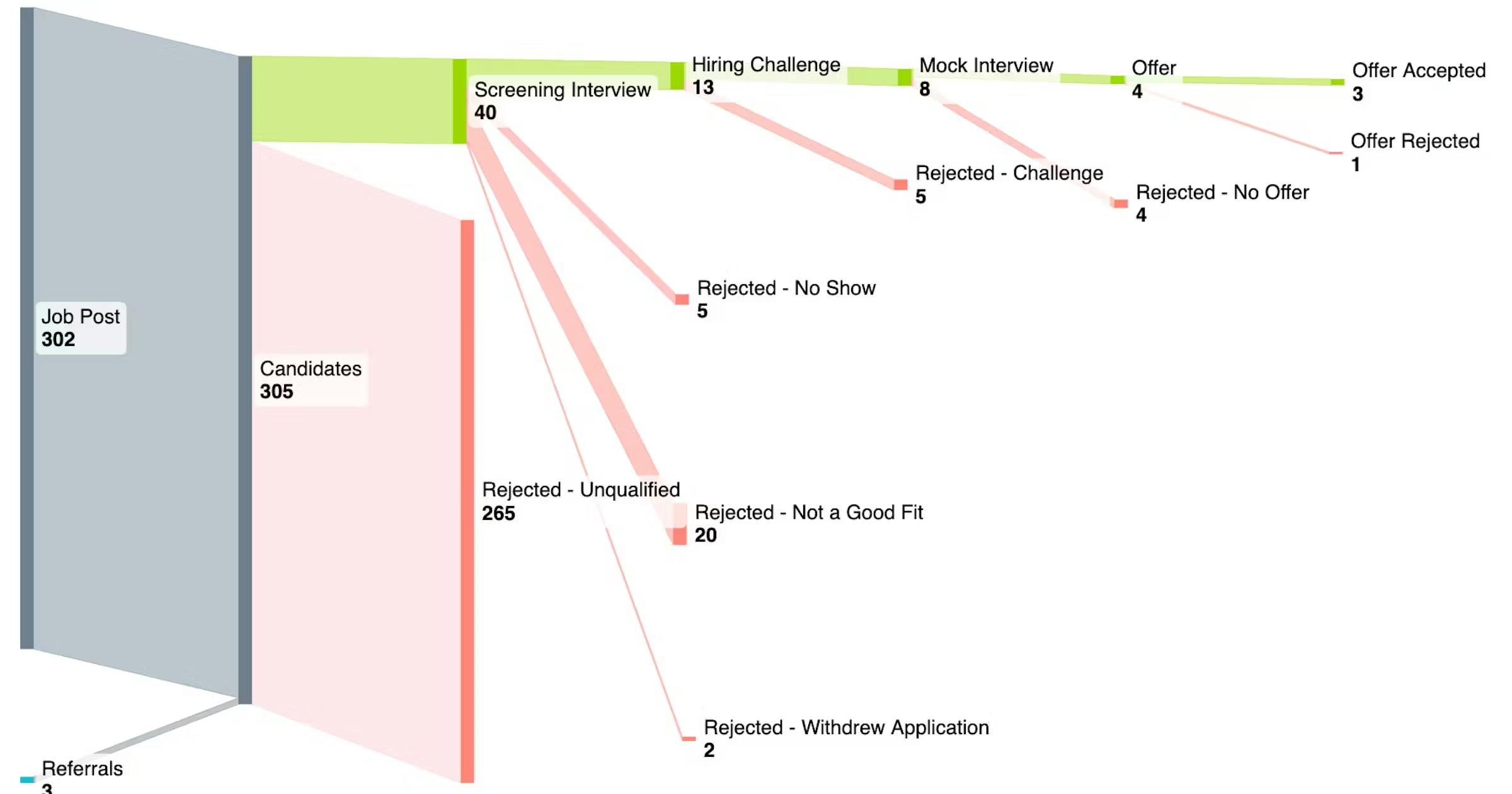Picture the best developer in the world.
Lives and breathes code. Can make software behave by just glowering at it. Weaves an intricate tapestry of 1s and 0s like an IT spider.
But they’re late to every scrum. You can never reach them during work hours. Their documentation’s a mess.
Takes the shine off the apple, doesn’t it?
A good remote developer is the same as a good employee in any industry – they need soft skills.
Things like collaboration and communication. Perseverance, adaptability, punctuality. They can be just as important as work output.
We won’t preach to the converted; this isn’t a controversial stance.
More than 9 in 10 talent professionals say soft skills are as important as hard skills when making hiring decisions, if not more so. 80% believe they play a growing role in overall business success.1
This article will help you identify and locate them in your remote developers.
Table of Contents
- Why Soft Skills Matter for Remote Developers
- Common Soft Skills to Prioritize
- Pre-Screening Soft Skills
- Assessing Soft Skills during Interviews
- Practical Assessments for Soft Skills
- Tools for Evaluating Soft Skills
- Soft Skills Needn’t Be Hard
Why Soft Skills Matter for Remote Developers
For all its benefits, remote working brings its own challenges.
Little-to-no in-person communication. Time-zones. Overreliance on self-motivation.
These challenges call for soft skills. Without them, problems arise.
For example:
There’s a natural tendency for remote workers to collaborate less.2 Miscommunication causes more than half of project failures.3
But having the right digital communication soft skills – like active listening, the ability to provide timely structured updates, and being comfortable with asynchronous tools – can improve collaboration productivity by 25%.4
These soft skills aren’t just “nice-to-haves”. They’re essential for a successful business.
Common Soft Skills to Prioritize
What are the key software engineer soft skills you should be searching for?
From our research into this article, these are our picks for the most important soft skills required for remote developers:
- Communication: Things like active listening and clear written and verbal communication keep remote projects aligned and prevent misunderstandings.
- Teamwork: The ability to give and receive constructive feedback, being proactive in remote meetings, and effective virtual collaboration ensures smooth progress and builds trust across dispersed teams.
- Time management: This isn’t just about starting work at 9:00 rather than 9:03. Managing their schedule well – which covers things like prioritisation and calendar discipline – helps devs meet deadlines without direct supervision.
- Problem-solving: Skills like independent thinking, root cause analysis, and taking the initiative are essential when you can't quickly turn to a teammate for help.
- Cultural awareness: It might seem less obvious on a day-to-day basis, but respecting and understanding global differences strengthens team cohesion and reduces friction, even if it’s as simple as respecting local holidays or cultural norms.
Pre-Screening Soft Skills
You’ll have your own idea of what soft skills are important to you. How can you gauge them from a CV?
It might be tempting to list soft skills as application requirements in your job ad, but word to the wise: it’s usually not worthwhile, unless they’re really critical or demonstrable.
They don’t really act as “screening” skills. Find me one person who says they’re not a good communicator, for example. You’ll just waste words, make your advert too long, or put people off.
But that doesn’t mean you can’t start looking for soft skills at the application stage.
Of course, you might get lucky and have someone list all their soft skills in a nice STAR format (we’ll look more at this later), but that’s unlikely.
If someone’s worked remotely before, there’s probably some evidence of soft skills, even if it’s not explicit. Clues and breadcrumbs that hint at them, like “I led asynchronous standups across time zones” or “I delivered features ahead of sprint deadlines”.
Consider what soft skills are most important for you and be on the lookout for signs your candidates might have them. What might they say that’d tip you off?
But it doesn’t always occur to people to highlight their soft skills on their résumé, even indirectly. So don’t assume that because it’s not there, they don’t have it.
It’s up to you to assess them later. Which brings us to…
Assessing Soft Skills during Interviews
Soft skills are clearly important. Yet less than half (41%) of companies have processes in place for measuring soft skills.1
Why aren’t we checking for them?
The short answer is:
It’s hard.
More than half (57%) of those who try say they struggle.1
One problem is many interviewers look for soft skills through subjective social cues. This subjects them to bias. It’s inconsistent.
There’s also time pressures – especially when there’s such an onus to drill into “hard” skill capabilities due to their easier measurability.
But that doesn’t mean all hope is lost. There are methods for grading soft skills. They might not be perfectly quantifiable, but they can still give you a good idea:
- Behavioural questions
Really simple, you just ask candidates about times they’ve used specific soft skills. There doesn’t need to be any major format to it. “Tell me a time you’ve had to work asynchronously”.
- Role play or scenario-based questions
Pose the soft skills question as a real-world example, especially if it’s something that specifically happens where you work. “Imagine your colleague is consistently missing stand-up calls – how would you react?”
- Specifically asking STAR-focused questions
Guide candidates to structure their answers around the Situation, Task, Action, Result framework. You don’t have to spell it out per se, but just help them get there. “Have there ever been any issues dealing with isolation where you’ve worked? What did you do? What was the outcome?”
Practical Assessments for Soft Skills
We mentioned time constraints. You may not get the chance to ask all your soft skills questions.
And it’s not as though you can (or should) add an extra interview just for soft skills. You want to keep your Time To Hire low to increase recruitment success.
So what can you do outside an interview to assess soft skills for web developers?
Well, a few things:
Test projects
A short test project can establish a candidate's technical skills, as well as their ability to self-manage, communicate effectively, and otherwise handle themselves remotely. Two birds with one stone! Just don’t assign anything too major – extensive tests can be off-putting. If you’re concerned the soft skills aren’t coming through clearly enough, you can ask for documentation or a mini project diary detailing how the candidate worked.
Live scenarios
These are like test projects on a smaller scale, without the output. Give candidates a single theoretical task or situation and see how they’d respond. Maybe move the goalposts during a coding test and watch how they react and adapt.
Communication tasks
Of course, there’s always the brute force approach. You set tasks for coding – why not directly for soft skills? Have them Slack you updates on their test progress, or have them draft an email outlining the details of a technical issue for a non-technical person.
Tools for Evaluating Soft Skills
We also mentioned earlier (we’re circling back a lot in this article) about the danger of bias in evaluating soft skills for software developers.
The best way to achieve objectivity is to measure things as fairly as possible.
More often than not, that means using tools.
Here are some options that don’t break the bank:
Collaboration tools – Do you use Slack where you work? Jira? Notion? Whatever it is, have your candidate use it with you during the recruitment process. Simulate real discussions. Is their communication clear? Is it timely? If it’s new to them, do they pick it up quickly? Evaluate from the usage of these platforms the soft skills that are most important to you, and you’ll have solid evidence to back up how you feel.
Video interviews – It’s a first port of call for many, but if you haven’t introduced video interviews for your remote developers, do. It enables you to pick up on non-verbal soft skills cues like body language and eye contact in a way that phone interviews can’t. Plus, the mild pressure that an interview situation brings can tell you a lot about someone’s ability to perform under scrutiny.
Personality assessments – things like Myers-Briggs or DISC, while not directly tools for assessing soft skills, can still give you some insights into traits like collaboration and initiative. In many circles, personality tests like these have been debunked for being unscientific, so don’t put all your eggs in this basket – let it be a bonus insight rather than your whole assessment.
Soft Skills Needn’t Be Hard
Soft skills might seem like some mysterious, nebulous, immeasurable concept, but they don’t have to be.
With the right mindset, and by knowing what evidence to look for, you can establish it in much the same way you do with hard skills.
If you think you’ve found the perfect developer, but you’re worried their soft skills are lacking, all is not lost. They can be trained.
In fact, developers who are good at using generative AI are 5x more likely to develop soft skills like creative ideation, design thinking, and emotional intelligence.5
Of course, if you still feel like soft skills assessment is beyond you, we’re always here to help with the heavy lifting.
References
1: Lobosco, M. LinkedIn Report: These 4 Ideas Are Shaping the Future of HR and Hiring, 2019. LinkedIn. Accessed 9th July 2025.
2: Yang, L., Holtz, D., Jaffe, S. et al. The effects of remote work on collaboration among information workers, 2021. Nature Human Behaviour. Accessed 14th July 2025.
3: Monkhouse, P. My project is failing, it is not my fault, 2015. PMI. Accessed 14th July 2025.
4: Burghin, J, Chui, M, & Manyika, J. Capturing business value with social technologies, 2012. McKinsey. Accessed 15th July 2025.
5: Global Talent Trends, 2024. LinkedIn. Accessed 15th July 2025.
Tech hiring insights in your inbox
From engineers to engineers: helping founders and engineering leaders hire technical talent.
We will only ever send you relevant content. Unsubscribe anytime.








